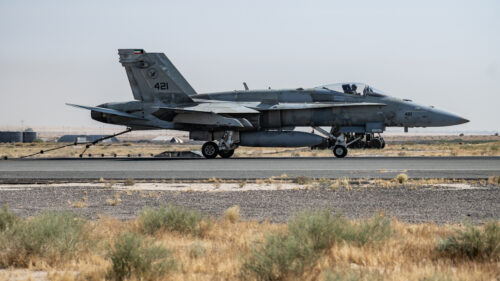Kuwait has assured Malaysia that it has no objections to Malaysia’s request to purchase its F/A-18 Hornet fighter jets. This assurance follows a visit by a Royal Malaysian Air Force (RMAF) technical team to Kuwait in June to discuss the potential procurement. While Kuwait is open to the sale, the final decision rests on two conditions: approval from the United States, the aircraft’s manufacturer, and the completion of Kuwait’s own acquisition of newer fighter jets, including the F/A-18E and F/A-18F Super Hornets and the Eurofighter Typhoon.

U.S. Air Force photo by Staff Sgt. Kevin Long
Malaysia’s Defence Minister Datuk Seri Mohamed Khaled Nordin, who recently concluded an official visit to Kuwait to bolster bilateral defence cooperation, confirmed Kuwait’s positive stance. He emphasised that Kuwait’s approval is contingent upon the US greenlighting the deal and Kuwait receiving its full complement of new aircraft.
To facilitate the procurement process once these conditions are met, a joint committee comprising Malaysian and Kuwaiti officials will be established. The urgency stems from Malaysia’s pressing need to modernise its air force capabilities. The country’s Multi-Role Combat Aircraft (MRCA) acquisition programme, launched in 2011, has encountered significant delays. Failure to secure the Kuwaiti Hornets would necessitate a fresh search for new jets, setting back the procurement timeline by three to four years.
Khaled expressed gratitude to the Kuwaiti government for understanding Malaysia’s requirement for the aircraft. He revealed that his meetings with Kuwaiti leaders, including the Prime Minister Sheikh Ahmad Abdullah Al-Ahmad Al-Sabah and Deputy Prime Minister Sheikh Fahad Yousef Saud Al-Sabah, also encompassed discussions on a broader defence and security partnership.
Both sides expressed a willingness to formalise their defence cooperation through a memorandum of understanding (MoU). This agreement would underscore the shared interests of both nations in regional stability, with Kuwait viewing the South China Sea as a critical area and Malaysia closely monitoring developments in the Middle East. The MoU would provide Malaysia with insights into Middle Eastern issues from Kuwait’s perspective and open avenues for collaboration in areas like research and development.
Beyond defence, Khaled sees significant potential for expanding bilateral relations and economic cooperation between the two countries. He noted Kuwait’s investment interests in sectors such as real estate, agriculture, and pharmaceuticals, and welcomed reciprocal investments from Malaysian companies in Kuwait. Khaled expressed confidence that his visit would serve as a catalyst for stronger ties and cooperation, grounded in shared faith, values, and sincerity.
For more information, hit the Source below